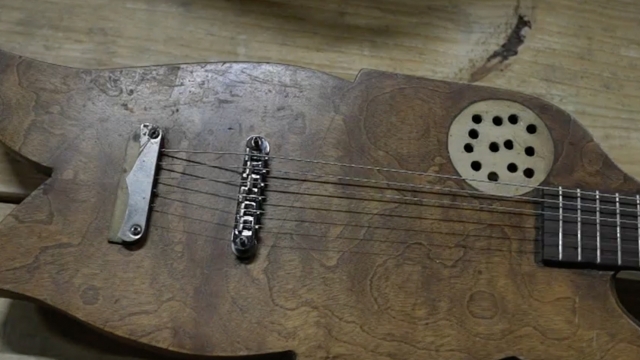A North Carolina artist is creating more awareness of Black culture in America by turning something racially violent into something meaningful and impactful, and cementing himself in Black history with his work, Hanging Tree Guitars.
"Music in North Carolina is very important," said Tim Duffy, president of the Music Maker Foundation. "It's one of the unrecognized birthing places of American music."
If you want a slice of Southern history and American culture, look no further than Fountain, North Carolina.
"The enslaved Africans came to the eastern seaboard," Duffy said, "Freeman's ancestors have been there since 1670-1700."
In the heart of the town square, you'll find Freeman Vines, a man of wisdom, art and Black culture.
"The kind of music I like really isn't music," Vines said. "It's more like a feeling. I had this feeling 50 to 60 years ago. The music enveloped me in a way that I was the music. And I believe that's the purpose of these guitars here."
Vines transforms materials from forgotten landscapes in pursuit of building guitars. From tobacco barns to radio parts, he creates hand-carved guitars, with each grain of wood telling a story of the past.
"The wood has its own characteristics," Vines said. "I could change the concept of it, but it wouldn't be fun then. You let the wood dominate the way that it's going to look and how it's going to be and stuff. And that's about the deal. If it had no history or no background and it had never done nothing, it doesn't intrigue me as much."
But what has brought his work to life and will echo in American Black history are four guitars he created from a mysterious pile of wood, which is documented by Duffy.
SEE MORE: How Memphis' Lorraine Motel became a mainstay in Black history
"I walked into his studio, and it had a drawing of a tree and a noose coming down with a guitar" Duffy said. "And I asked what he was doing, and he said, 'I'm making hanging tree guitars.'"
"The wood that intrigued me the most was some wood they lynched a man on," Vines said.
"He was gifted some boards from a tree that they use to lynch people from by an old man," Duffy said
"The man said, 'you might not want that wood there because they hung a man on that tree,'" Vines said. "But the wood has a character, and everyone sees it a different way. The shape and the form mean something different to everybody that looks at it."
His artwork is now rooting itself in Black history, telling stories of the spiritual unrest and the toll of racial violence living in the very grain of America itself.
"It's a very even-handed look as a poet coming up under severe racial terror," Duffy said. "And how do you live under racial terror? Even though it happened ninety years ago Freeman was the first Black man in that neighborhood to openly say, 'They killed my brother down the street.' I would argue if you looked at all these images, they're not guitars, they're sacred relics."
But Vines creates these guitars in his shop every day to find a particular sound he said has been haunting his dream.
"At some point he had a visionary experience where he heard this sound," Duffy said. "He had a mystical experience and I think that changed his life."
"That sound did something to my head," Vines said. "I have no idea what it is, but it's more of a feeling ... I think that's the purpose of doing all this, leaving a legacy and seeking that sound."
But along the way Vines found a way to bring awareness to Black culture, until he finds that sound and whatever it means.
Trending stories at Scrippsnews.com



